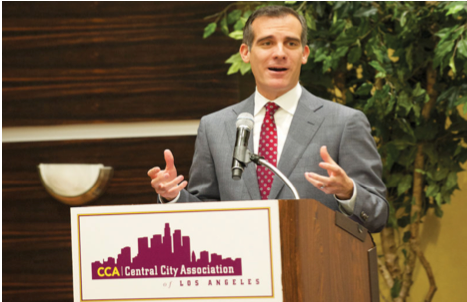CommentsPLATKIN ON PLANNING-According to the San Jose Mercury News, Los Angeles Mayor Eric Garcetti conditionally supports Senator Scott Wiener’s proposed Senate Bill 827, which has been amply pilloried – for good reasons – at CityWatchLA. The mayor’s one condition is that an amendment to this real estate bill should protect existing rent stabilized apartments from demolition.
Considering how much has already been written about the vast pitfalls of SB 827 and considering that -- to the best of my knowledge - there is no local community group in Los Angeles that supports Wiener’s legislation, this is a bold step by the Mayor. Does it mean he has already concluded that his embarrassing march to the White House runs through Wall Street, instead of Main Street? Time will tell, but meanwhile we already know this.
By only requesting one amendment to SB 827, Mayor Garcetti has announced that he can live with these other implicit pitfalls:
- Pitfall 1: The bill contains no affordable housing requirements, and it will therefore supplant LA’s two affordable housing ordinances, SB 1818 and Transit Oriented Communities. Why would any investor opt for these complicated options, when SB 827 offers far more incentives to any property a half-mile from a rail corridor or a quarter-mile from an express bus line – without any affordable housing requirement? Under SB 827 investors only need to build market housing.
- Pitfall 2: SB 827 is an across-the-board, totally free and unscrutinized General Plan Amendment, Zone Change, and/or Zone Variance for all properties in SB 827’s overage areas. This means there will be no notifications, no workshops, no public hearings, no debate or votes by the City Planning Commission and City Council, and no right of appeal or legal challenge.
- Pitfall 3: By circumventing General Plan Amendments, Zone Changes, and Zone Variances, SB 827 also eliminates the application of the California Environmental Quality Act (CEQA) to these discretionary actions. SB 827 cuts off CEQA at the knees.
- Pitfall 4: SB 827 also eliminates the ability of cities to implement their General Plans through zoning in all areas in proximity to rail and express bus corridors. This feature will decimate the planning laws across the entire state of California.
- Pitfall 5: SB 827 will encourage local communities to fight for reduced transit services because SB 827 only applies to neighborhoods adjacent to bus lines with 15 minute or less bus service. If headways move from 15 minutes to 20 minutes, then counties, cities, towns, and neighborhoods will be exempt from SB 827. What an easy but ridiculous work-around.
- Pitfall 6: SB 827 will promote the loss of employment in local commercial and manufacturing zones because if property owners choose to build by-right apartments at these sites, all zoning provisions for heights (up to 85 feet), yards, Floor Area Ratios, design requirements, number of stories, and parking will be lifted. If they stick with commercial uses, then they are limited by existing zoning requirements.
- Pitfall 7: SB 827 will eliminate all Historical Preservation Overlay Zones Specific Plans, Residential Floor Area Districts, and Community Design Overlay Districts within a half-mile of a rail line and quarter-mile from an express bus line. Hardly any zoning overlay districts will remain.
- Pitfall 8: SB 827 will cause a feeding frenzy of real estate speculation and flipping in its coverage area because its elimination of zoning provisions allows a much larger building envelope, with much fewer zoning requirements. This sudden increase in the market vale of hundreds of thousands of private properties in California will cause a massive real estate bubble. Furthermore, these increase values and prices will force developers to build high-end projects to cover their higher land acquisition costs.
- Pitfall 9: Protection of rent-stabilized units does not apply to most of the properties deregulated by SB 827. Nearly all properties at subway stations, light rail stations, and express bus lines are commercial, not residential. Furthermore, most of the properties several blocks away from these areas are single-family homes, not subject to LA’s Rent Stabilization Ordinance. Finally, any apartment constructed after 1978 or that has had a new renter since 1978, is no longer covered by the Rent Stabilization Ordinance.
- Pitfall 10: Within these single-family neighborhoods, the scourge mansionization will be placed on steroids. The elimination of nearly all zoning provisions in these residential areas would result in even larger and uglier McMansions. For that matter, SB 827 would even allow by-right, expensive apartment buildings towering over existing homes.
Conclusion: Even with Mayor Garcetti’s one amendment to protect existing rent-stabilized units, SB 827’s new residential units will be high-priced. The only people who could afford to buy or rent them are the well off, the segment of the population that is mostly like to own and use a car and is least likely to take mass transit. As a result, SB 827 will not reverse the long-term decline in transit ridership, and it will not succeed in addressing LA’s housing crisis.
But, it might help the Mayor’s goal to run for higher office.
(Dick Platkin is former Los Angeles city planner who reports of local planning issues for CityWatchLA. Please send any comments or corrections to [email protected].) Prepped for CityWatch by Linda Abrams.
















